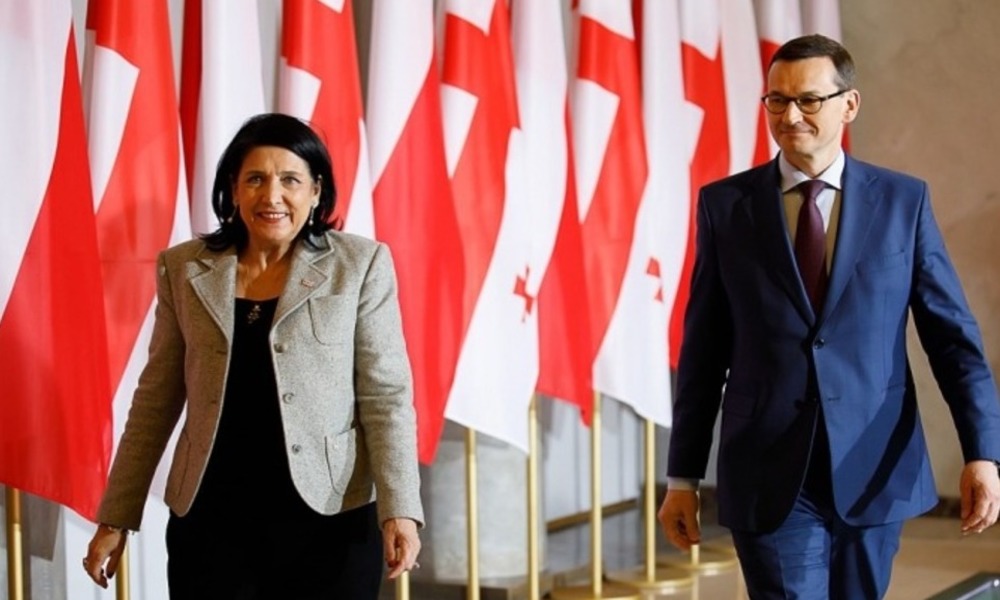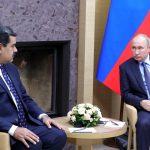NEWS
Date: 13 May 2019 Author: Mateusz Kubiak
Does Georgia Seek U.S. Military Presence?
Located in the Caucasus, Georgia has witnessed a debate over a likely U.S. military presence on its soil. The discussion ensued in the aftermath of a recent interview that Georgian President Salome Zourabishvili gave for Voice of America, stating that setting a possible U.S. military base in the country would not be advisable as such a move could be perceived as hostile by Russia. Her comment has arisen indignation while Georgia’s governing party openly dissented from the president’s words. How to understand the situation and what Tbilisi’s real geopolitical course is?

In NATO’s waiting room
It should first be noted that the Georgian Dream party, which has governed Georgia since 2013, has retained prior foreign policy priorities formulated back when Mikheil Saakashvili was president while sustaining the country’s pro-Western orientation. Importantly, shortly after the party launched by Bidzina Ivanishvili, Georgia’s richest man who had back in time built his business empire in Russia, many wondered whether Georgia would to a greater extent review its international course. The new team in power eventually cemented economic ties with Russia, which, however, did not exert any influence on Tbilisi’s Euro-Atlantic ambitions or its prospects for further cooperation with the United States or the North Atlantic Alliance.
As for Georgian foreign policy, its fundamental point of reference can be traced back to the landmark events of 2008 when NATO allies refused to grant Georgia the Membership Action Plan status in April, followed by the June five-day war with Russia. Since that time and despite developing a comprehensive set of mechanisms for mutual cooperation, Georgia’s NATO accession was actually frozen as the Alliance sought to avoid an outright confrontation with the Russian Federation. Although 11 years have passed since NATO’s official declaration that Georgia will become its member, there are still no bright prospects for Tbilisi’s membership, with Georgia’s utmost attempts made to make their accession a fact. Stationed on Afghan soil, the Georgian contingent is the fourth largest group (!) of all countries taking part in the NATO-led Resolute Support Mission.
Support Us
If content prepared by Warsaw Institute team is useful for you, please support our actions. Donations from private persons are necessary for the continuation of our mission.
U.S. interest
The present-day partnership between Washington and Tbilisi takes place both within the framework of particular NATO program and at the bilateral level. Georgia has traditionally emerged as a significant beneficiary of U.S. developmental and military aid, with an amount of $125 million allocated by the U.S. Congress for the 2019 budget year. Two years ago, under a decision by the Trump administration, Georgia received U.S.-made lethal weapons, including Javelin missile systems, which was not the case during Obama’s term in office. Tbilisi’s attempts might be explained by its urge to ensure stability both in the country and across the region. And yet, it seems that potential military bases will also entail some broader interests.
Though no official declaration has yet been made, the United States would become interested in installing its military barracks on Georgian soil due to several tendencies, among which are Russia’s ongoing militarization in the Black Sea region along with complicated cooperation between the West and Turkey regarding the situation in Iran. Most importantly, given the current geopolitical setting, Georgia has naturally emerged as the most logical location to establish U.S. military barracks of all the countries of the Caucasus. As for the remaining states of the region, Armenia still rely on Russia in multiple dimensions while neighboring Azerbaijan, which needs to take into account Moscow’s policy due to the Nagorno-Karabakh conflict, would not be able to provide the United States with access to any of its naval ports under the provisions of last year’s Convention on the legal status of the Caspian Sea.
Will Tbilisi give the green light for the U.S. barracks?
Regardless of all the issues as mentioned above, a separate issue is whether there is a point in considering a potential U.S. military base in Georgia. In fact, none of the parties has so far confirmed that a discussion over such a scenario has actually taken place while a recent debate was encouraged in the aftermath of what Georgian President said in an interview.
Though a group of Georgian citizens referred to her words as outrageous, while some even called for impeachment proceedings against Zourabishvili, dislocating U.S. troops in the Southern Caucasus would indeed meet with a reaction from Russia as the latter sees the region as its own sphere of influence. In consequence, Moscow could, on the one hand, seek to further boost its military presence in Abkhazia and/or South Ossetia while, on the other, undertaking other activities targeted against Georgian interests, including economic ones. Due to their current policy, the authorities in Tbilisi would be by no means prone to expose themselves to an additional confrontation with Moscow. None of the members of the Georgian government will, however, admit it publicly, especially that the country is currently grappling with a number of domestic policy problems.
This article was originally published at “Dziennik Związkowy”














